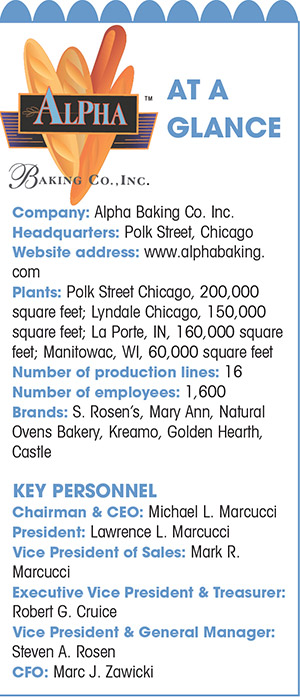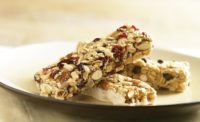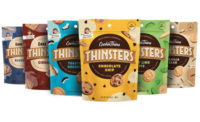History runs deep at Chicago-based Alpha Baking Co. Inc. Its iconic S. Rosen’s brand traces its roots back to 1909, when Samuel Rosen moved to Chicago in his early 20s, and began baking his Old World hearth rye breads and delivering them throughout the city via horse and buggy. He had been honing his craft since age 9, when he left his home in Poland to apprentice with a baker in Germany, eventually making his way to New York at age 13.
Today, Samuel’s grandson, Steve Rosen, works at Alpha Baking Co. as vice president and general manager. Alpha Baking Co. joined forces with S. Rosen’s Baking Co. in 1981.
Some aspects of production have remained intact throughout the ensuing century. “Our rye breads still use a natural starter based on the original recipe from the early 1900s,” says Larry Marcucci, president, Alpha Baking Co. “We mix and refresh our starter each day, 365 days a year.”
But the horse and buggy found themselves replaced by a regional, company-operated fleet of 330 trucks and vans serving eight states, along with contracted distribution serving the rest of the country.
Another legendary Alpha Baking Co. brand, Mary Ann, got its start in 1935 in Chicago, baking poppy seed hot dog buns, the go-to roll for Chicago-style hot dogs across the country. If you’ve ever eaten a true Chicago-style hot dog, chances are, it was on an S. Rosen’s Mary Ann poppy seed bun. More than 90 percent of Chicago-area hot dog stands use Mary Ann buns.
Mary Ann was also the genesis of Alpha Baking Co., with Larry and his cousin, Michael Marcucci, establishing the company in 1979 after the acquisition.
Other key additions to the Alpha Baking Co. family of brands include acquisition of Kreamo Bakers in 1979, National Baking Co. in 1997 and Natural Ovens Bakery—a pioneer in all-natural, preservative-free breads—in 2007.
From the beginning
Alpha Baking Co. has roots in Detroit, when the Marcucci cousins were presented with the opportunity to run their own bakery in that city. At the time, they worked in their family bakery in Chicago. They bought the bakery in Detroit and began cutting their teeth on their own. After they acquired Mary Ann Baking Co. in 1979, Alpha Baking Co. was born.
“The reason we ended up back in Chicago was that the Chicago bakery was many times larger than the Detroit plant, and required much more hands-on managing,” says Larry.
The next big step was the merger with S. Rosen’s Baking Co. in 1981. “We consolidated the production, and we got into the retail business,” says Larry. “We were in the specialty bread business, and they got into the soft buns business. We were able to leverage our soft buns into the retail market and utilize their specialty breads on our restaurant routes. So, it just made for a great combination. That really was what started us rolling in the early ’80s.”
The acquisition of Natural Ovens Bakery in 2007 brought a new niche to Alpha Baking Co. “It gave us a presence in the organic products lines, the natural products lines,” says Larry. “So, we were able to leverage some of that into our retail operations, and it gave us a lot broader scope to build from.”
Today, Alpha Baking Co. operates four plants, including two in Chicago. Its La Porte, IN, plant came through the acquisition of Kreamo Bakers, and its Manitowac, WI, facility was the original home of Natural Ovens Bakery. All four plants are certified-kosher, and the Wisconsin plant is certified-organic. Regular inspections are conducted by AIB International, Silliker Labs, ASI Food Safety and FDA.
Alpha Baking Co. just installed a new bun line at its Lyndale Avenue plant in Chicago. “We were making some bagels and some specialty products,” says Larry. “We took that equipment out and put in a fully automated bun line.” The new line will help increase capacity for buns, and open another line for production of more bread.
The primary Alpha Baking Co. retail brands are S. Rosen’s and Natural Ovens Bakery, but the bakery has cultivated a diverse customer base that includes all sizes of retail venues, local foodservice operators, multiunit chains, national chains, broadline distributors and specialty distributors. The bakery’s fresh market direct store delivery is concentrated in Wisconsin, Illinois and Indiana, while frozen distribution is nationwide.
Strong diversity
Product diversity is a hallmark of Alpha Baking Co., and the number of stock-keeping units (SKUs) it offers across its customer network exceeds 1,000. The bakery notes that its buns—including specialty, gourmet, multigrain and brioche—have been posting impressive gains of late. The brioche buns are the most-recent addition to the lineup.
Another new product is its co-branded sweet yeast rolls with Dickey’s Barbecue Restaurants, the largest barbecue chain in the U.S. with more than 500 locations in 43 states. Dickey’s is working with Alpha Baking Co. to bring its sweet yeast rolls, served in the restaurants with meals, to the frozen section at retail. “They’re trying to leverage their brand into the grocery stores,” says Larry. “We’re trying to leverage our products into the frozen section. So, it’s a good partnership, and it’s a whole new area for us.”
The 1997 acquisition of National Baking Co. boosted Alpha Baking Co.’s frozen national foodservice business. “Since the acquisition, we have seen significant growth year after year within that category, double-digits in fact and what a nice wave to ride,” says Tim J. Gill, vice president, frozen national foodservice.
“Our business within the frozen national foodservice segment has always been coast to coast,” says Tim. “We have just increased our volume within that national footprint. We’ve gotten better as volume has grown, and that has allowed us to logistically be competitive, helping us reach new customers.””
The bakery is flexible when it comes to required minimums for orders. “We always want to take a long-range view of where the business will be going,” says Gary D. Narcisi, group vice president, frozen foodservice & retail divisions.
The bakery’s strong position in foodservice has led to a vibrant culture of innovation. “We get directional requests from a variety of customers,” says Mark Marcucci, vice president of sales. “Some customers use enough product to spec a custom product exclusively for them. Other times, our salespeople bring back requests for products that they are seeing trending in their market. We bring that information back to our R&D department and start development based on our capabilities. Once a product is developed and approved, if the product is not proprietary, we roll it out to the entire market.”
For a bakery that has a significant investment in the buns and rolls category, the “better burger” trend has also provided a strong boost to business in recent years. “When the consumer goes out to buy a hamburger, it’s all bigger, better buns, bigger, better burgers,” says Tim.
Despite the ever-present nature of better-for-you today, how people walk often differs from their talk. “People talk about healthy and then just pile more and more stuff on top of their burger,” says Gary.
But better-for-you bakery products are poised to emerge in connection with select demographics. “We are watching it because we know in particular the Millennial generation is looking for better-for-you products,” says Gary.
“Another interesting note is convenience store business,” says Tim. “They are really evolving now. Some are getting very close to fast-casual. When you go into a convenience store, you can pick up a very nice meal on a whole-wheat roll or brat bun, or seven-grain bread—you’ll also find ciabatta product as a sandwich carrier.” He sees a high level of competition across retail and foodservice chains along these lines.
School foodservice has proved a strong market for Alpha Baking Co. “Some of our best products are our new school items to meet the new school nutritional standards,” says Mark. “These items have been very successful on a nationwide basis.”
Private label is also part of the business plan. “We have such diverse frozen distribution that we can pretty much tackle any private label customer,” says Larry.
Retail approaches toward private label tactics have changed in recent years. “What we have noticed, for a long time, is that on private label or contract packaging, you used to leverage your brand and then go ahead and bake some of the retailer’s brand,” says Gary. “What is happening now is they want to go just to their brand. But it better be as good as the national brands.”
Forward-trending
Nostalgia runs deep in the bakery world. “We still sell wax-wrapped Pullman breads,” says Larry, referring to the square pan breads made famous via their use in luxurious Pullman dining cars during the heyday of fashionable railroad travel in the late 19th and early 20th centuries. “Most of these loaves are used in toasted sandwiches like club sandwiches, so we formulate that bread for optimal toasting, unlike the softer-style retail products.”
While traditional buns, rolls and loaf breads remain the core of Alpha Baking Co.’s business, new offerings, like brioche, are building interest. “The brioche—that is the hot ticket right now,” says Tim, noting that any brioche formulated line extensions, such as hamburger buns or sausage rolls, are what’s trending now. “I think you are going to see it pushing to other products.”
The 1,000-plus SKUs Alpha Baking Co. offers give customers a wealth of choices. “There’s a nice diversity, from hearth-baked products to screen-baked products to core commodity types of products,” says Tim.
For Alpha Baking Co. customers, that diversity makes all the difference.
For some insight into the distribution logistics Alpha Baking Co. faces, see "Alpha Baking co. tackles logistics challenges."










